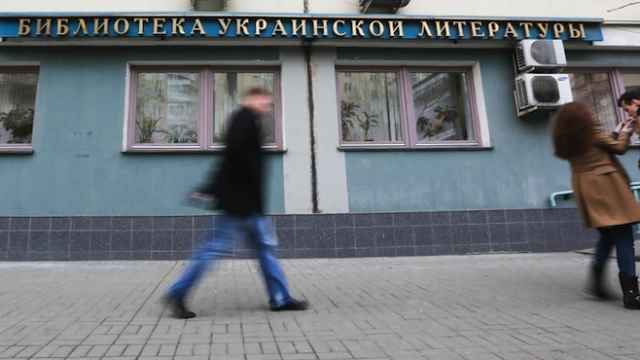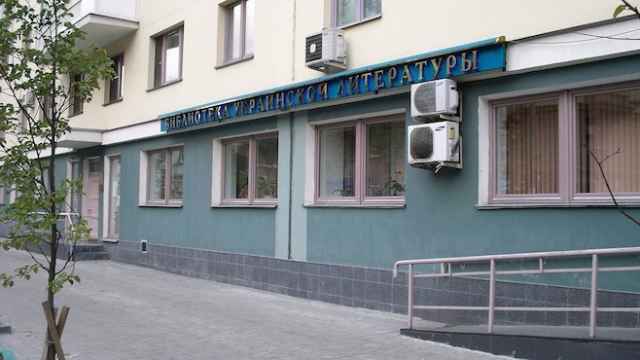The trial of Natalya Sharina, the director of Moscow's State Library of Ukrainian Literature, began on Wednesday in one of the city's district courts, the “Team 29” association of lawyers now defending the woman told The Moscow Times.
Sharina is charged with embezzlement and “inciting ethnic hatred,” and faces up to 10 years in prison, if convicted.
On Oct. 28, 2015, the library was searched and Sharina was arrested on the grounds of “inciting ethnic hatred and humiliating human dignity.” During the search of the library, police found books they say are “extremist.” Two days later, Sharina was released from jail and placed under house arrest.
The sudden crackdown on the library and its director came as Russian-Ukrainian relations reached a new low point, leading to speculation that the police raid was politically motivated. Before long, the entire library was labeled extremist and shut down.
In April, police also charged Sharina with embezzlement. According to investigators, she spent 3.5 million rubles ($55,000) from the library's funds to pay her own legal fees.
Read more coverage about this crackdown: Director of Moscow Library of Ukrainian Literature Accused of Inciting Hatred
There are two criminal cases against the library, Sharina’s lawyer, Ivan Pavlov, the leader of “Team 29,” told The Moscow Times. The first case was launched six years ago. “In 2010, when law enforcement first came to the library, Sharina hired a lawyer to protect the institution,” Pavlov said. “This lawyer accompanied her when she was interrogated by police. In addition, two lawyers worked at the library part-time. This, according to prosecutors, constitutes embezzlement.”
The lawyer says the state's embezzlement charges are are a “safety net,” just in case the court dismisses the extremism charges, which both Sharina and Pavlov consider bogus. At her first court hearing on Wednesday, Sharina refused to plead guilty. Her lawyer said the defense doesn’t understand the accusations against her.
“The investigation hasn’t specified which of her actions were criminal. They just concluded that she ’organized free access’ [to extremist materials], but they never specified what exactly she did to organize it,” Pavlov said. “You can organize access to extremist materials by, say, uploading them on the Internet, or by obligating your employers to force them onto readers, or by reading them out at public events. But the investigation hasn’t specified what actual action she took.”
A Message from The Moscow Times:
Dear readers,
We are facing unprecedented challenges. Russia's Prosecutor General's Office has designated The Moscow Times as an "undesirable" organization, criminalizing our work and putting our staff at risk of prosecution. This follows our earlier unjust labeling as a "foreign agent."
These actions are direct attempts to silence independent journalism in Russia. The authorities claim our work "discredits the decisions of the Russian leadership." We see things differently: we strive to provide accurate, unbiased reporting on Russia.
We, the journalists of The Moscow Times, refuse to be silenced. But to continue our work, we need your help.
Your support, no matter how small, makes a world of difference. If you can, please support us monthly starting from just $2. It's quick to set up, and every contribution makes a significant impact.
By supporting The Moscow Times, you're defending open, independent journalism in the face of repression. Thank you for standing with us.
Remind me later.






